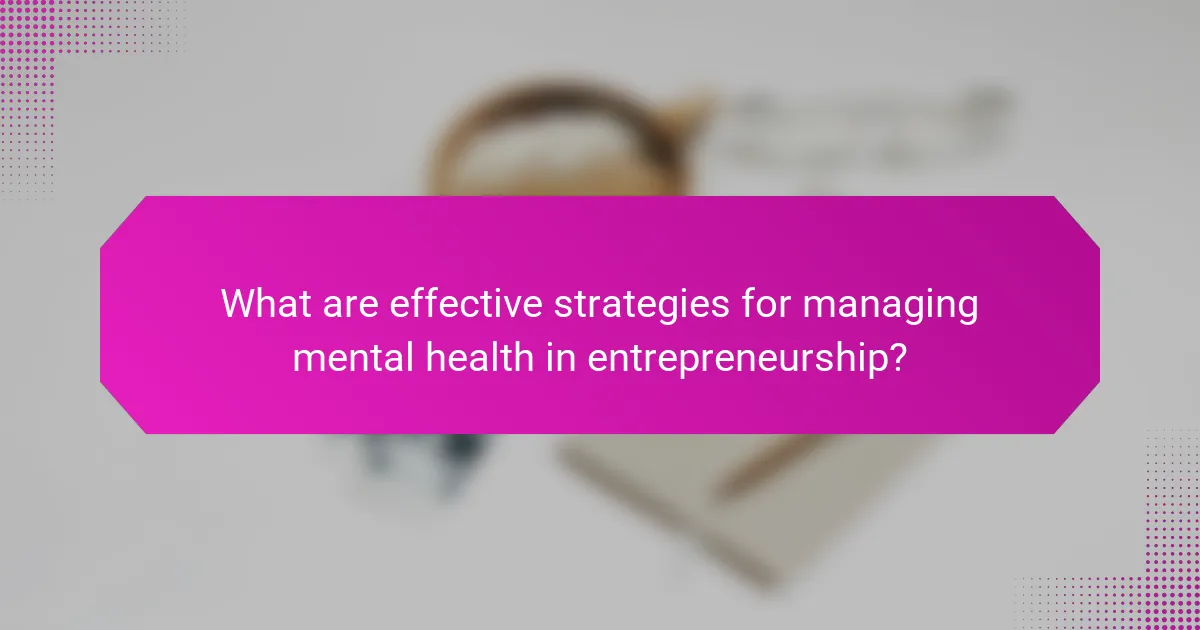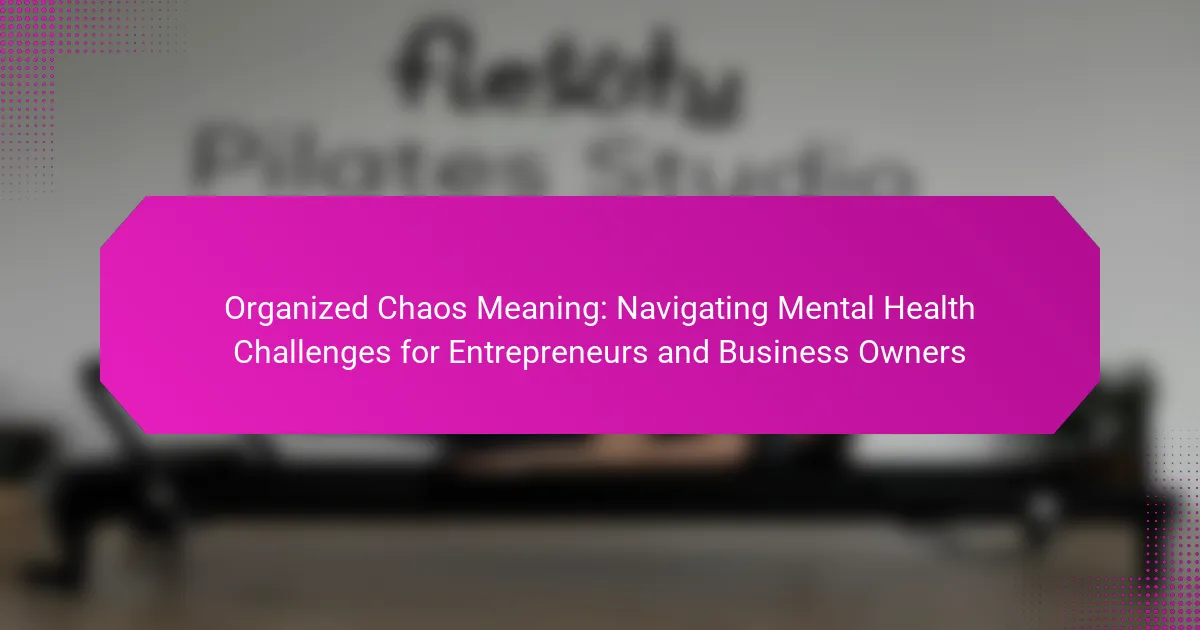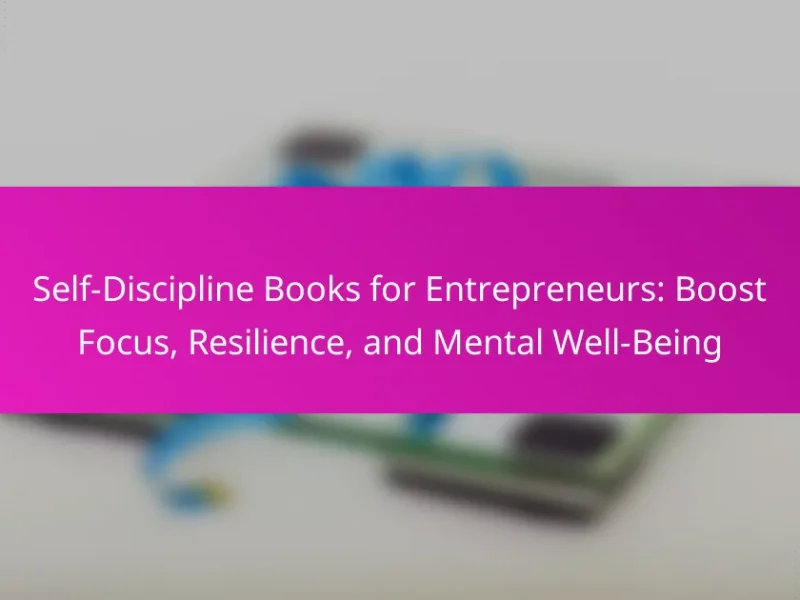Navigating mental health challenges is crucial for entrepreneurs and business owners facing organized chaos. This article explores the impact of uncertainty on creativity and problem-solving, highlights unique mental health issues like burnout and imposter syndrome, and offers effective strategies for managing stress and promoting well-being. Establishing routines, seeking support, and practicing mindfulness are essential for maintaining mental health in the entrepreneurial landscape.

What does Organized Chaos mean in the context of entrepreneurship?
Organized chaos in entrepreneurship refers to the ability to thrive amidst uncertainty while maintaining focus. Entrepreneurs often face unpredictable challenges, requiring them to adapt quickly. This approach fosters creativity and innovation, enabling effective problem-solving. Balancing structure with flexibility is crucial for mental health, allowing business owners to navigate stress and uncertainty effectively.
How does the concept of Organized Chaos apply to mental health?
Organized Chaos can positively impact mental health by fostering adaptability and creativity in entrepreneurs. This approach allows individuals to embrace uncertainty, reducing stress associated with rigid structures. By creating flexible systems, entrepreneurs can manage mental health challenges more effectively, promoting resilience and innovation. For instance, research indicates that a chaotic yet organized environment can enhance problem-solving skills, which is crucial in high-pressure business settings.
What are common mental health challenges faced by entrepreneurs?
Entrepreneurs commonly face mental health challenges such as anxiety, stress, burnout, and depression. These issues stem from high pressure, uncertainty, and the demands of managing a business. Anxiety can manifest as constant worry about performance and financial stability. Stress often arises from juggling multiple responsibilities and tight deadlines. Burnout results from prolonged periods of intense work without adequate rest. Depression may occur due to feelings of isolation and overwhelming challenges. Addressing these challenges is crucial for sustainable business success and personal well-being.
What role does stress play in entrepreneurial mental health?
Stress significantly impacts entrepreneurial mental health, often leading to burnout and anxiety. Entrepreneurs face unique pressures, including financial instability and decision-making responsibilities. Chronic stress can hinder creativity and problem-solving abilities, essential for business success. Research shows that 72% of entrepreneurs experience mental health challenges, emphasizing the need for effective stress management strategies. Prioritising self-care and seeking support can mitigate these effects, fostering resilience and better mental health outcomes.
How does isolation impact business owners’ mental well-being?
Isolation negatively impacts business owners’ mental well-being by increasing feelings of loneliness and stress. These factors can lead to burnout, decreased productivity, and impaired decision-making. Research indicates that entrepreneurs often face unique mental health challenges due to the pressures of running a business. For instance, a survey found that 72% of entrepreneurs experience mental health issues, highlighting the need for support systems. Building connections through networking and community engagement can mitigate these effects, fostering resilience and improving overall mental health.
What are the universal attributes of mental health challenges among entrepreneurs?
Entrepreneurs face universal mental health challenges including stress, anxiety, and burnout. These issues stem from high demands, uncertainty, and isolation. The unique attribute of entrepreneurial stress is its chronic nature, often exacerbated by financial pressures and decision-making responsibilities. As a result, mental health support is crucial for maintaining productivity and overall well-being.
How do work-life balance issues manifest in entrepreneurship?
Work-life balance issues in entrepreneurship often manifest as chronic stress and burnout. Entrepreneurs frequently struggle to separate work from personal life, leading to decreased mental health and productivity. The unique attribute of entrepreneurship involves high responsibility and long hours, which can exacerbate these challenges. As a result, many entrepreneurs experience emotional exhaustion, anxiety, and a sense of isolation. Addressing these issues is crucial for maintaining mental health and sustaining business success.
What are the signs of burnout in business owners?
Burnout in business owners manifests through signs such as chronic fatigue, irritability, decreased productivity, and feelings of isolation. These symptoms can lead to significant mental health challenges, impacting both personal and professional life. Recognising these signs early is crucial for effective intervention and support.

What unique mental health challenges do entrepreneurs face?
Entrepreneurs face unique mental health challenges such as high stress, isolation, and burnout. These issues stem from constant pressure to perform and make critical decisions. The uncertainty of business outcomes exacerbates anxiety levels, leading to chronic stress. Additionally, the lack of a support network can result in feelings of loneliness, impacting overall well-being. Burnout is prevalent due to long hours and the demands of managing a business. Addressing these challenges is crucial for sustaining both mental health and business success.
How do high expectations contribute to mental health struggles?
High expectations can lead to significant mental health struggles by creating constant pressure and fear of failure. This pressure often results in anxiety, stress, and burnout, particularly for entrepreneurs and business owners. Studies indicate that individuals with high expectations may experience increased levels of perfectionism, which correlates with mental health issues. As a result, managing expectations is crucial for maintaining well-being and fostering a healthier work environment.
What is the impact of financial uncertainty on mental health?
Financial uncertainty negatively impacts mental health by increasing stress and anxiety levels. Entrepreneurs often experience heightened pressure due to unpredictable income and market fluctuations. This can lead to burnout, depression, and decreased overall well-being. Research indicates that around 70% of business owners report mental health challenges related to financial instability. Addressing these issues through support networks and stress management techniques is crucial for maintaining mental health.
How does the fear of failure affect entrepreneurs’ mental well-being?
Fear of failure significantly impacts entrepreneurs’ mental well-being by inducing stress and anxiety. This emotional strain can lead to burnout and hinder decision-making. Studies show that over 60% of entrepreneurs experience mental health issues, often stemming from the pressure to succeed. Additionally, fear can stifle creativity, limiting innovation and growth opportunities. Addressing this fear through support systems and resilience-building strategies is essential for maintaining mental health.

What rare mental health issues might entrepreneurs encounter?
Entrepreneurs may encounter rare mental health issues such as maladaptive perfectionism, which can hinder productivity. Additionally, they might face imposter syndrome, leading to chronic self-doubt. These challenges can stem from the unique pressures of entrepreneurship, including high expectations and constant uncertainty. Understanding these rare attributes is crucial for navigating mental health effectively.
What are the effects of imposter syndrome on business owners?
Imposter syndrome negatively impacts business owners by inducing self-doubt, anxiety, and reduced confidence. These effects can hinder decision-making and stifle creativity, ultimately affecting business growth. Studies show that 70% of people experience imposter syndrome, highlighting its prevalence among entrepreneurs. This phenomenon can lead to burnout, as owners may overwork to compensate for perceived inadequacies. Addressing mental health challenges is essential for fostering resilience and success in the entrepreneurial journey.
How can entrepreneurs experience anxiety differently from others?
Entrepreneurs often experience anxiety differently due to their unique pressures and responsibilities. Unlike others, they face constant uncertainty, decision-making stress, and the burden of financial risks. This organized chaos can lead to heightened anxiety levels, as they navigate the demands of their business while managing personal well-being. The unique attribute of entrepreneurial anxiety stems from the need to balance ambition with mental health, often resulting in a constant state of alertness and self-doubt. As a result, entrepreneurs may develop coping mechanisms that differ significantly from those used by individuals in more traditional work environments.

What are effective strategies for managing mental health in entrepreneurship?
Effective strategies for managing mental health in entrepreneurship include establishing routines, seeking support, and practicing mindfulness. Entrepreneurs can benefit from structured schedules to create stability amidst chaos. Connecting with mentors or peers provides emotional support and accountability. Mindfulness techniques, such as meditation, enhance focus and reduce stress. Prioritising self-care and setting boundaries are essential for maintaining mental well-being.
How can entrepreneurs create a supportive work environment?
Entrepreneurs can create a supportive work environment by fostering open communication, encouraging collaboration, and prioritising mental health. Providing resources such as flexible work hours and wellness programs enhances employee satisfaction. Regular feedback and recognition contribute to a positive atmosphere, promoting both productivity and well-being.
What role does seeking professional help play in mental health management?
Seeking professional help is crucial for effective mental health management. It provides entrepreneurs and business owners with tailored strategies to navigate stress and anxiety. Professional guidance offers unique insights into coping mechanisms, enhancing resilience. Regular sessions can foster accountability, ensuring consistent progress in mental well-being. Access to mental health resources can significantly improve overall productivity and decision-making.
What types of therapy are beneficial for entrepreneurs?
Cognitive Behavioral Therapy, mindfulness practices, and coaching are beneficial for entrepreneurs. These therapies help manage stress, enhance decision-making, and improve emotional resilience. Cognitive Behavioral Therapy focuses on changing negative thought patterns, while mindfulness practices promote present-moment awareness. Coaching provides personalised guidance to navigate challenges effectively.
What are practical tips for maintaining mental health as a business owner?
To maintain mental health as a business owner, prioritise self-care, set boundaries, and seek support. Regular exercise, adequate sleep, and healthy eating enhance well-being. Implement time management techniques to reduce stress. Engage in mindfulness practices to improve focus and reduce anxiety. Networking with other entrepreneurs can provide valuable insights and emotional support.
How can time management techniques reduce stress?
Time management techniques can significantly reduce stress by promoting organisation and efficiency. Effective scheduling allows entrepreneurs to prioritise tasks, leading to a clearer focus and less overwhelm. Techniques such as the Pomodoro method enhance productivity by breaking work into manageable intervals, reducing mental fatigue. Additionally, setting specific goals and deadlines helps to prevent procrastination, which is a common source of stress. As a result, these strategies create a structured environment that fosters mental clarity and resilience against challenges.
What self-care practices are essential for entrepreneurs?
Essential self-care practices for entrepreneurs include setting boundaries, prioritising mental health, and maintaining a balanced lifestyle. Regular exercise, mindfulness, and adequate sleep significantly enhance focus and resilience. Networking with peers can provide emotional support and reduce isolation. Incorporating breaks into the workday fosters creativity and prevents burnout.
What common mistakes should entrepreneurs avoid regarding mental health?
Entrepreneurs should avoid neglecting self-care, isolating themselves, and ignoring signs of burnout. These mistakes can lead to severe mental health challenges. Prioritising mental well-being enhances productivity and decision-making. Establishing a support network is crucial for maintaining balance and resilience.
How can building a strong support network improve mental health outcomes?
Building a strong support network significantly enhances mental health outcomes for entrepreneurs and business owners. Such networks provide emotional support, practical advice, and resources that help navigate challenges.
Research indicates that social connections can reduce stress and anxiety levels, leading to improved mental resilience. For instance, entrepreneurs with supportive peers report higher satisfaction and lower burnout rates.
Additionally, engaging with a diverse network fosters innovative thinking and problem-solving, essential for overcoming business obstacles. This collaborative environment nurtures a sense of belonging, crucial for mental well-being.
Ultimately, a robust support network acts as a buffer against the pressures of entrepreneurship, promoting healthier coping strategies and overall mental health.
What best practices can enhance mental resilience in business ownership?
Building mental resilience in business ownership involves adopting specific best practices. Prioritising self-care, such as regular exercise and adequate sleep, enhances overall well-being. Establishing a strong support network provides emotional stability and diverse perspectives. Setting realistic goals fosters a sense of accomplishment and reduces overwhelm. Embracing adaptability allows entrepreneurs to navigate challenges effectively. Practicing mindfulness techniques, like meditation, can improve focus and reduce stress. Lastly, continuous learning and skill development can boost confidence and resilience in facing uncertainties.


